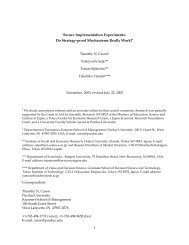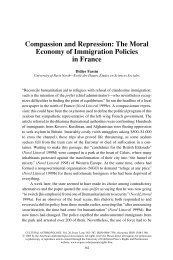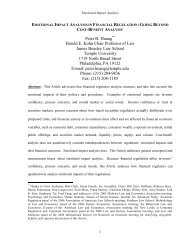Governance, Growth, and Development Decision-making - School of ...
Governance, Growth, and Development Decision-making - School of ...
Governance, Growth, and Development Decision-making - School of ...
Create successful ePaper yourself
Turn your PDF publications into a flip-book with our unique Google optimized e-Paper software.
importance <strong>of</strong> institutions as independent or intermediate variables<br />
supporting growth has been well documented. 8<br />
Economic growth does, however, have certain predictable social<br />
<strong>and</strong> political consequences that affect the conditions for institutional<br />
change <strong>and</strong> hence growth in subsequent time periods. For example,<br />
a lot <strong>of</strong> classic social theory predicates the emergence <strong>of</strong> modern<br />
civil society on economic development. 9 As growth occurs <strong>and</strong> firms<br />
take advantage <strong>of</strong> economies <strong>of</strong> scale, social specialization increases<br />
<strong>and</strong> new social groups (e.g., an industrial working class) emerge. The<br />
fluidity <strong>and</strong> open access dem<strong>and</strong>ed by modern market economies<br />
undermines many traditional forms <strong>of</strong> authority <strong>and</strong> encourages the<br />
replacement <strong>of</strong> ascriptive with voluntary social groups.<br />
The emergence <strong>of</strong> new social actors as a result <strong>of</strong> development<br />
has a complex <strong>and</strong> potentially opposite impact on state-building,<br />
rule <strong>of</strong> law, <strong>and</strong> democracy, <strong>and</strong> consequently on prospects for<br />
growth. On the one h<strong>and</strong>, Huntington (1968) 10 argued that there is<br />
<strong>of</strong>ten a negative relationship between the mobilization <strong>of</strong> new social<br />
actors <strong>and</strong> political order when existing political institutions could<br />
not accommodate their dem<strong>and</strong>s for participation. Something like<br />
this scenario is unfolding today in Andean countries like Ecuador<br />
<strong>and</strong> Bolivia, where newly mobilized indigenous communities are<br />
dem<strong>and</strong>ing greater political participation in destabilizing ways.<br />
On the other h<strong>and</strong>, there is another body <strong>of</strong> thought that argues<br />
that growth produces a propertied middle class, which then presses<br />
for a rule <strong>of</strong> law to protect those rights, <strong>and</strong> subsequently political<br />
participation. The correlation that exists between economic<br />
8<br />
If resources alone were enough to guarantee good institutions, it is hard to<br />
explain the divergent development paths <strong>of</strong> South Korea <strong>and</strong> Nigeria since<br />
the 1950s.<br />
See, for example: William Easterly & Ross Levine, (2002). “Tropics, Germs,<br />
<strong>and</strong> Crops: How Endowments Influence Economic <strong>Development</strong>,” NBER<br />
Working Papers 9106, National Bureau <strong>of</strong> Economic Research, Inc, revised.<br />
9<br />
For example: Gellner, Ernest, (1994). Conditions <strong>of</strong> Liberty: Civil Society<br />
<strong>and</strong> Its Rivals (London: Hamish Hamilton)<br />
10<br />
Huntington, Samuel P., (1968). Political Order in Changing Societies (New<br />
Haven: Yale University Press).<br />
30<br />
<strong>Governance</strong>, <strong>Growth</strong>, <strong>and</strong> <strong>Development</strong> <strong>Decision</strong>-<strong>making</strong>
















